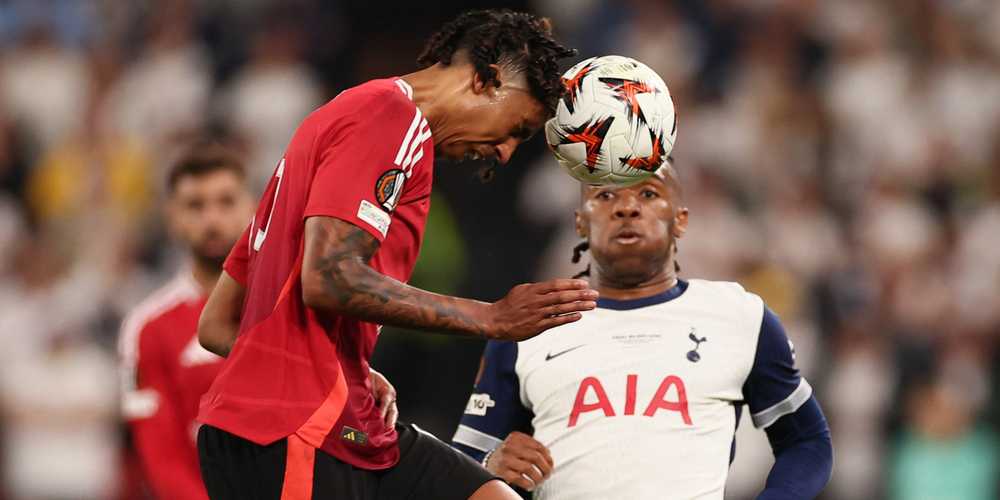Sport
4 Mistakes Ruben Amorim Made in Man United’s Europa League Final Loss

It was heartbreak for Manchester United and their fans as the Red Devils fell short in the Europa League final, suffering a narrow 1-0 defeat to Tottenham Hotspur. The high-stakes clash, which carried the reward of a Champions League spot and silverware, ended in bitter disappointment for a United side desperate to salvage their season. A solitary goal from Brennan Johnson was enough for Spurs to lift their first trophy since 2008, while United were left to reflect on what went wrong.
The Europa League final was seen as a potential turning point for Ruben Amorim at Manchester United. Appointed with high hopes, Amorim’s tenure at Old Trafford has been plagued by inconsistency, and Wednesday’s final represented a golden opportunity to silence his critics. Instead, the performance exposed his inexperience at the top level, with several questionable decisions contributing to United’s downfall.
One of the more glaring tactical missteps came in the form of Leny Yoro’s positioning. Widely regarded as one of football’s brightest young defenders, Yoro was fielded on the right of a back three, an unfamiliar position for the teenager. Meanwhile, Luke Shaw, who has struggled with fitness and form, was chosen on the left. This imbalance allowed Spurs to exploit defensive gaps, particularly as Shaw lacked the pace and sharpness to deal with Tottenham’s quick transitions. Fans were quick to react online, questioning why Yoro wasn’t played in his natural left-center back role.
In midfield, Amorim’s decision to drop Bruno Fernandes deeper also raised eyebrows. Fernandes has been the creative heartbeat of United all season, consistently delivering in the attacking third. Yet in this crucial game, he was deployed in a more conservative midfield role to accommodate Mason Mount further up the pitch. The move blunted Fernandes’ attacking threat and removed United’s most potent creative force from areas where he could have made a difference. The decision backfired, with fans on social media lamenting the lost opportunity to let Fernandes dictate the final from the front.
Perhaps even more frustrating for supporters was Amorim’s hesitation to make substitutions. Despite trailing at halftime and looking flat in attack, United waited until the 71st minute to make any changes. By that point, the momentum had already swung firmly in Tottenham’s favour. Garnacho and Zirkzee, once introduced, did offer a spark, but the delay in making tactical adjustments arguably cost United valuable time to claw back the game.
Even more puzzling was the decision to leave Kobbie Mainoo on the bench for so long. The 19-year-old midfielder has been a rare highlight in a season full of underachievement. His composure and vision have drawn praise, and he’s shown a knack for making a difference in high-pressure situations. Yet Amorim opted to keep him on the sidelines until the dying minutes. By the time Mainoo entered the pitch, the team was already chasing shadows. His presence may have altered the tempo had he been brought on earlier.
The combination of these missteps painted the picture of a coach who appeared overwhelmed by the occasion. In finals, tactical flexibility and game management are crucial, but Amorim seemed unwilling or unable to adapt as the match unfolded. Tottenham, in contrast, were well-drilled, disciplined, and took their opportunity when it came.
This defeat also raises questions about Amorim’s future at Old Trafford. While he remains a coach with promise, his handling of this final exposed a steep learning curve. With no trophies to show and Champions League football now out of reach, the club’s board will be forced to reflect on whether Amorim is the man to lead their next rebuild.
For United fans, the pain is familiar. Another season without silverware, another moment where promise failed to materialize. What made this one sting more was the sense that the defeat was self-inflicted. Tottenham were solid but not spectacular, and United had enough talent to win — if only their tactics had allowed it.
Amorim will have the summer to regroup, but pressure is mounting. With top players seeking assurance and the club’s ambitions clear, failure to learn from this final could lead to bigger consequences. For now, he must reflect on the choices that led to this loss and figure out how to rebuild trust — and results — going forward.
As Spurs celebrated under the Dublin sky, United were left to walk off the pitch with heavy legs and heavier hearts. In the end, it wasn’t just Brennan Johnson’s goal that separated the sides — it was the decisions made in the dugout.
-

 Sport9 months ago
Sport9 months ago“I’m not trying to criticize Ancelotti, but I’m not happy with him for benching that player”: Bellingham Expresses Frustration Over Ancelotti’s Tactical Decision
-

 Sport9 months ago
Sport9 months agoBREAKING: Manchester City vs Liverpool Clash Cancelled! Title Race Takes a Twist
-

 Sport9 months ago
Sport9 months agoArsenal Poised for January Swoop on €70 Million Star Dusan Vlahovic
-

 Sport9 months ago
Sport9 months agoWHAT ON GOD’S GREEN EARTH DID WE JUST SEE?!
-

 Sport9 months ago
Sport9 months agoReal Madrid: Carlo Ancelotti’s Surprising Revelations About an Unexpected Quality of Vinicius
-

 Sport9 months ago
Sport9 months agoBREAKING: Arsenal’s Champions League Quarterfinal Opponent Revealed After Monaco’s Dramatic Win – Tough Challenges Await Arteta’s Men
-

 Sport9 months ago
Sport9 months agoChelsea Players Facing Suspension as Yellow Cards Mount
-

 Sport9 months ago
Sport9 months agoKey Arsenal Player Set for Return as Gunners Face Struggling Everton
